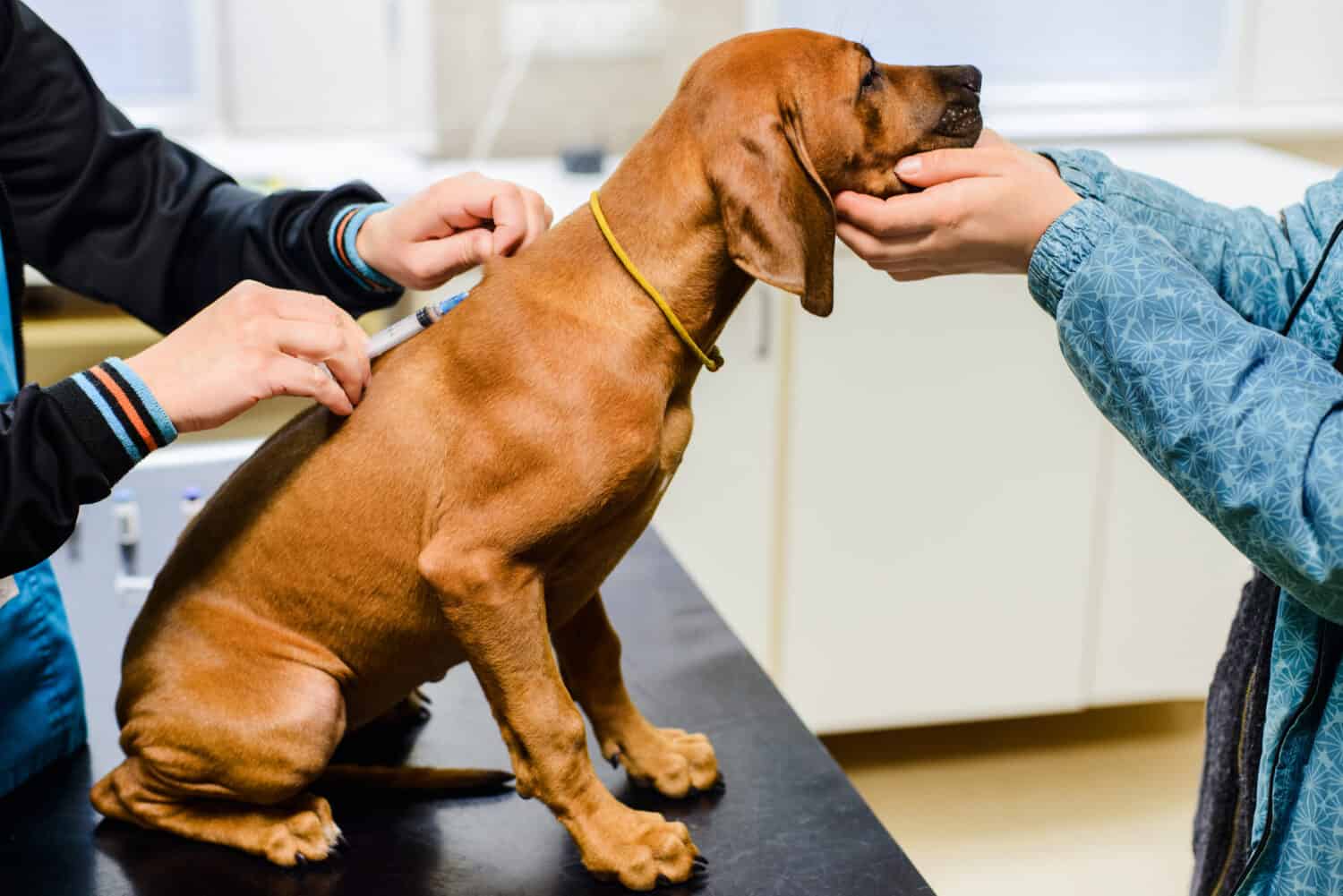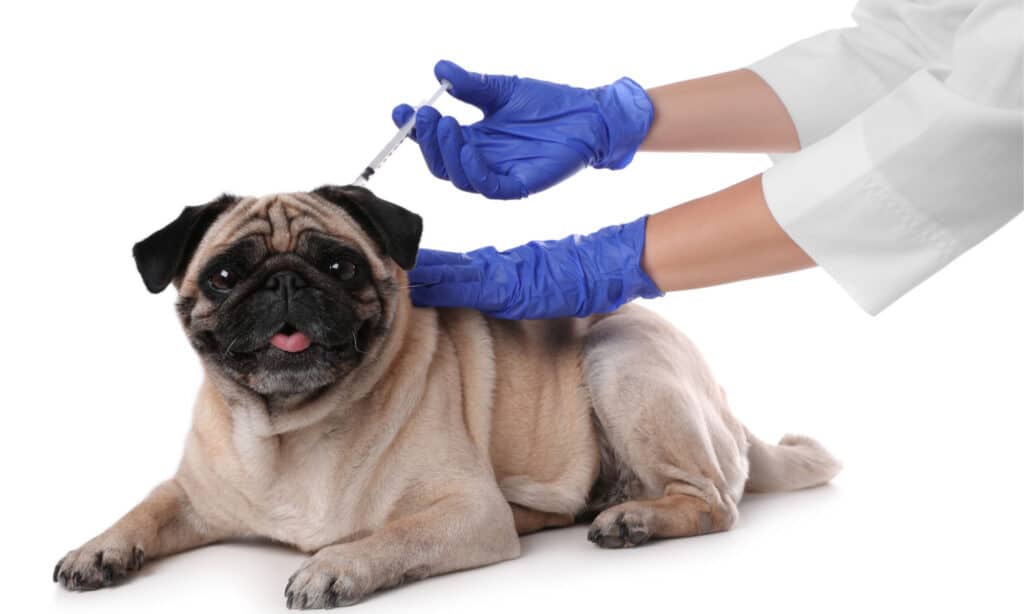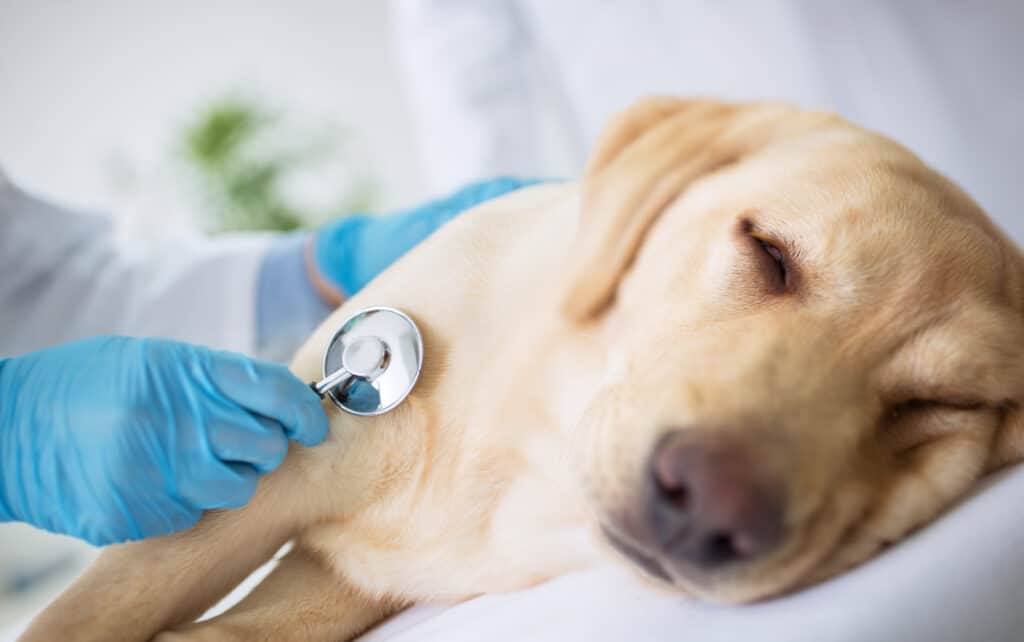As dog owners, we feel helpless when our four-legged companions fall ill. Seeing our once energetic pups become lethargic, nauseous, and jaundiced is heartbreaking. Unfortunately, these are common symptoms of one of the scariest health conditions our dogs can face – hepatitis.
Hepatitis is a serious liver inflammation that can have devastating impacts if left untreated. While the diagnosis may come as a shock, try not to panic. With an understanding of the condition, appropriate medical attention, and vigilant home nursing, dogs can recover fully from hepatitis.
Though hepatitis in dogs can be frightening, arming yourself with knowledge gives you the power to act. Stay hopeful, be diligent with care, and celebrate every milestone. With your love and support, your dog can beat this scary disease.

Canine hepatitis causes dysfunction and inflammation of the liver.
©olgagorovenko/Shutterstock.com
Infectious Canine Hepatitis
Also known as “Rubarth’s disease,” infectious canine hepatitis is caused by canine adenovirus type 1 (CAV-1). This extremely contagious virus spreads through contact with urine, feces, saliva, or respiratory secretions of an infected dog. It attacks and damages liver cells, causing inflammation and dysfunction of the liver.
Some signs of infectious canine hepatitis include:
- High fever
- Loss of appetite
- Vomiting
- Diarrhea
- Abdominal pain
- Jaundice (yellowing of skin and whites of eyes)
- Bleeding disorders
- Eye inflammation (uveitis)
- Breathing difficulties
In severe cases, infectious canine hepatitis can cause liver failure and even death. The mortality rate can be as high as 80% in untreated dogs. Even if dogs recover, liver damage can become permanent. There is no cure for canine hepatitis, so treatment focuses on supportive care.
Thankfully, there are now effective vaccines to prevent this frightening disease. Puppy vaccination and adult dog booster shots typically include vaccination against canine adenovirus type 1. Annual boosters are important to maintain immunity.
Chronic Active Hepatitis
While acute canine infection is severe, chronic active hepatitis involves ongoing, long-term liver inflammation in dogs. It is most commonly seen in female dogs ages 3 to 10. The cause is unknown but likely involves genetic, immunologic, and environmental factors.
Chronic active hepatitis causes progressive destruction and scarring of liver tissue. Dogs experience symptoms like:
- Loss of energy and appetite
- Vomiting
- Diarrhea
- Abdominal swelling
- Jaundice
Without treatment, scarring can eventually lead to liver failure. Steroids and other medications suppress the immune system and reduce inflammation. However, the disease often progresses, and sick dogs may eventually require a liver transplant.
Chronic hepatitis is difficult to diagnose and treat. As liver damage worsens, dogs become increasingly ill. It’s a scary disease for both dogs and their owners. If liver failure occurs, it can be fatal.

You can protect your dog against hepatitis by staying current with vaccinations.
©iStock.com/Liudmila Chernetska
Protecting Your Dog from Hepatitis
While we can prevent infectious canine hepatitis through vaccination, chronic hepatitis is poorly understood or easily avoided. The best protections are regular vet checkups, a high-quality diet, and avoiding toxins or medications that stress the liver.
If your dog has suspicious symptoms like lethargy, reduced appetite, vomiting, or jaundice, immediately get them to the vet. Prompt diagnosis and care offer the best chance for recovery from hepatitis. Though the illness can be scary, dogs have a good prognosis if treated early.
As dog owners, it’s normal to feel frightened if our pup is diagnosed with hepatitis. However, focus on the things you can control – not the uncertainties. Many dogs recover well with excellent supportive care, rest, nutrition, and medication, even in serious cases.
Your vet will advise on the best treatments and home care if your dog develops this condition. Be vigilant with follow-up vet visits and monitoring their health at home. Report any changes or concerning symptoms promptly. Follow your vet’s instructions carefully, including finishing any prescribed medications as directed.
Though recovery takes time, you should start seeing gradual energy, appetite, and demeanor improvements. Celebrate every small sign of progress! With tender loving care and a little patience, your pup can beat hepatitis.

Make sure to follow the necessary steps for your dog during recovery.
©ilona.shorokhova/Shutterstock.com
Tips for Caring for Your Dog During Recovery
- Feed a bland, low-fat diet. Boiled chicken, rice, cottage cheese, or canned pumpkin are good options. Avoid fatty foods that are hard to digest.
- Give all medications as prescribed by your vet. Finish the full course even if your dog seems better.
- Encourage rest by limiting activity and playtime. Short, gentle leash walks are okay.
- Monitor appetite and bathroom habits. Note any changes like vomiting, diarrhea, or dark urine.
- Make sure your dog always has access to fresh water to stay hydrated. Consider adding chicken broth to encourage drinking.
- Watch for signs of jaundice, like yellow gums or eyes. Check their skin for itchiness or rashes.
- Give nourishing supplements if recommended by your vet. Milk thistle and SAM-e may help liver health.
- Avoid tick and flea preventatives and other drugs metabolized through the liver.
- Provide a comfortable, quiet area away from other pets during recovery. Give cozy blankets and toys.
- Shower your dog with gentle affection. This can lift their spirits and aid healing.
- Be patient – recovery takes time. Celebrate every little sign of progress!
Quality of Life During & After Canine Hepatitis
Coping with hepatitis can be hard on your dog both physically and mentally. Be proactive about maximizing their quality of life through illness and recovery. Monitor pain levels closely and discuss medication options with your vet. Signs of pain include whimpering, restlessness, panting, and loss of appetite. Engage their mind during rest periods with new toys, chews, puzzle feeders, and training sessions to prevent boredom.
Once your vet clears, provide short, gentle walks and playtimes to help lift spirits. Discuss potential long-term diet changes with your vet, as your dog may need a liver-friendly food prescription. Be a strong advocate for your dog during treatment discussions and voice any concerns about quality of life. Work closely with your vet to reassess and adjust treatment plans to optimize comfort and well-being.

The prognosis for hepatitis in dogs varies on several factors.
©didesign021/Shutterstock.com
Canine Hepatitis – What’s the Prognosis?
The prognosis for dogs with hepatitis depends on many factors, including overall health, the type of hepatitis, and how early treatment begins. Mortality rates are high for infectious canine hepatitis but much lower for chronic hepatitis. Still, every dog is different. Early intervention greatly improves chances of recovery, so seek prompt vet care at the first signs of illness.
Try to stay realistic but hopeful – focus on each day of healing rather than long-term uncertainties. Discuss prognosis openly with your vet, but be aware they can only make educated guesses. Emotionally prepare that setbacks can happen – your pup may seem better, then take a turn for the worse. Celebrate small milestones in your dog’s recovery; every progress is worth cherishing. Stay involved in your dog’s care, be their advocate, and cherish each day you have together through treatment.
Conclusion
Hepatitis is undoubtedly a concerning and serious illness in our canine companions. While the two types discussed here – infectious and chronic – can become severe if left untreated, try not to lose hope. Many dogs fully recover with proper veterinary care and supportive home care.
Focus on providing your pup with the best possible treatment, nutrition, rest, and loving attention. Celebrate every small step forward. And lean on your vet for guidance and support – their expertise gives your dog the best chance of beating hepatitis.
Though the road may be long, every extra day with your furry friend is a gift. Cherish the special moments you share as they regain their energy and spirit. With time, patience, and diligence, you and your beloved pup can overcome a hepatitis diagnosis together.
The photo featured at the top of this post is © ilona.shorokhova/Shutterstock.com
Ready to discover the top 10 cutest dog breeds in the entire world?
How about the fastest dogs, the largest dogs and those that are -- quite frankly -- just the kindest dogs on the planet? Each day, AZ Animals sends out lists just like this to our thousands of email subscribers. And the best part? It's FREE. Join today by entering your email below.
Thank you for reading! Have some feedback for us? Contact the AZ Animals editorial team.







